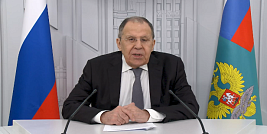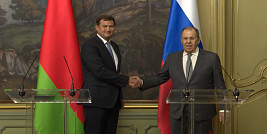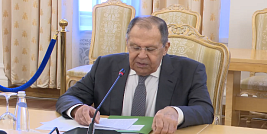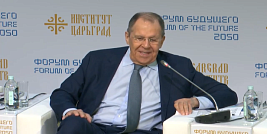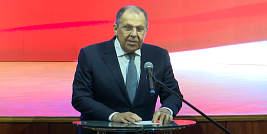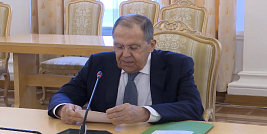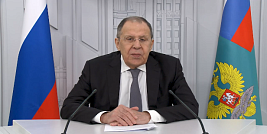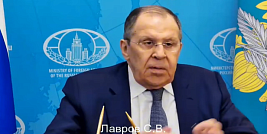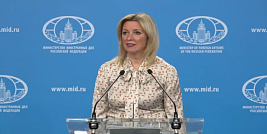Foreign Minister Sergey Lavrov’s statement and answers to media questions at a joint news conference following talks with Minister of Foreign Affairs of the Republic of Belarus Maxim Ryzhenkov, Moscow, June 10, 2025
Ladies and gentlemen,
Firstly, I would like to once again extend my sincere gratitude to Maxim Ryzhenkov for accepting our invitation to visit the Russian Federation. This marks his inaugural official visit to Russia in his capacity as Minister of Foreign Affairs of the Republic of Belarus.
We maintain regular contact through various multilateral engagements and within the framework of negotiations between our Presidents and Prime Ministers. However, as I have noted, this is the first official visit by our Belarusian counterpart to Russia.
We were pleased to dedicate the latter part of yesterday and the entirety of today to a thorough examination of all matters our foreign policy institutions are addressing under the instructions of our Presidents. They set the tone – one of trust and amity – for dialogue between friends. The same spirit characterises relations between our respective foreign ministries.
Over the past two days, we discussed further strengthening the strategic partnership and alliance between Russia and Belarus, particularly in terms of providing foreign policy support to integration efforts within the Union State. We highlighted the pivotal coordinating role of bilateral intergovernmental mechanisms established by presidential decisions, including the High-Level Group of the Council of Ministers of the Union State, which convened in Smolensk on May 28 this year, and the Working Group on Implementing the Provisions of the Treaty on the Creation of the Union State. Substantive, concrete work is underway. Nothing escapes the attention of the experts operating within these frameworks. Areas requiring additional effort are identified – a crucial step for sustained progress.
We are united in the belief that robust diplomatic support must underpin political dialogue at the highest level, as well as intergovernmental, interparliamentary, interregional, and interagency cooperation. The coordinating role of our ministries, as mandated by our Presidents – including within the Union State – remains clear. Among our key priorities is reinforcing the international standing of the Union State.
We note the steady implementation of a unique document in bilateral relations: the Programme for Coordinated Actions in Foreign Policy of the member states of the Treaty on the Creation of the Union State. This Programme is far from the first of its kind. The current iteration, adopted for 2024–2026, envisages close coordination, mutual support, and the joint defence and promotion of shared interests on the international stage. A critical technical instrument for the Programme’s strategic objectives is this year’s Plan for Inter-Ministerial Consultations. Within this framework, we develop common approaches across various areas of cooperation – including, as we emphasised today, consultations on issues not initially outlined in the Plan. It is not dogma, but a guide for action. Any emergent additional matters become subjects for further discussion. Given the current international climate, such issues can arise abruptly. We agreed on the agenda for the next annual joint session of the Collegiums of the Russian and Belarusian Foreign Ministries, scheduled for the fourth quarter of this year in St Petersburg.
We addressed pressing issues on the international agenda, reaffirming our mutual commitment to advancing joint efforts towards establishing an architecture of equal and indivisible security in Eurasia. This initiative was first articulated by our Presidents. President of the Republic of Belarus Alexander Lukashenko proposed holding annual conferences on this theme in Minsk – a proposal we enthusiastically endorsed. Today, we discussed preparations for the third Minsk Conference on Eurasian Security, announced for late October (October 28–29 this year).
Moments ago, in your presence, we signed a joint appeal to the foreign ministers of Eurasian states on promoting the Eurasian Charter of Diversity and Multipolarity in the 21st century.
We will enhance collaboration within Eurasian integration frameworks: the EAEU, CIS, CSTO, and SCO. We assured Belarus of Russia’s full support for its programme of EAEU chairmanship this year and stand ready to assist our Belarusian friends in deepening their engagement with BRICS, where Belarus has attained partner status. Our cooperation within the SCO remains close.
We synchronised our positions on current agenda items at the UN, OSCE, and other international bodies. We will continue to support each other in developing political and economic ties with Global South and East nations, and adhere to agreed approaches regarding those countries and associations currently led by unfriendly representatives.
We underscored the counterproductivity of politicising international cultural, humanitarian, scientific, and sporting exchanges. Our shared stance opposes the sanctions and legal aggression of the collective West against our nations and many others. We reaffirmed our mutual resolve to defend traditional spiritual and moral values, as well as historical truth – particularly in the context of this year’s 80th anniversary of Victory in the Great Patriotic War and the Second World War.
I briefed Maxim Ryzhenkov on the progress of Russia-Ukraine negotiations. We are grateful to our Belarusian friends for their support of all aspects related to the causes and conduct of the special military operation, for understanding our clear approaches to a peaceful settlement, and for their readiness to provide mediation services at any time, offer Belarusian territory for talks, facilitate exchanges, and assist in resolving humanitarian issues.
I deem these negotiations highly productive. We have reaffirmed our shared commitment to further strengthening coordination across the full spectrum of bilateral and international agenda items.
Question: Poland and the Baltic states, even compared to other Western nations, are notably distinguished by their particularly intense anti-Belarusian and anti-Russian rhetoric. What do you believe accounts for this phenomenon? Is it possible to influence this situation, considering that elections in these countries – as recently revealed in Poland – appear to produce no meaningful change?
Sergey Lavrov (adding after Maxim Ryzhenkov): As for Poland, regardless of one’s assessment of this country’s foreign policy, it remains grounded in approaches designed to preserve and strengthen national identity. Though, I emphasise that on the international stage, our Belarusian colleagues and we always observe Poland’s eagerness towards confrontation rather than constructive dialogue with our nations. We shall see how their foreign policy will evolve under the new president.
Regarding the three Baltic states, in addition to what Mr Ryzhenkov mentioned, a childhood association just came to mind. When you go out to play in the yard after school, three small troublemakers run up to you, demanding 15 kopecks or trying to take away your sandwich. And when you begin to put them in their place, the bigger bullies, the gang leaders who control these little ones and set them against decent people, come running out.
The current situation with these three Baltic states is similar, along with those “Euro-grandees” (as they call themselves) who manipulate Latvia, Estonia, and Lithuania in pursuit of their goal of constantly weakening the Russian Federation and all its friends and allies, including the Republic of Belarus. In other words, this is not an independent policy – these are puppets.
Question: How is the concept of Eurasian security being implemented in practice?
Sergey Lavrov: This concept represents one of the principal foreign policy initiatives of Russian President Vladimir Putin and Belarusian President Alexander Lukashenko. Speaking a year ago, on June 14, 2024, at the Ministry of Foreign Affairs, President Putin, among other things, articulated the objective of advancing the concept of Eurasian security architecture that would remain open to all countries and associations across the continent without exception. Our Belarusian partners maintain the same position.
As I mentioned, at the initiative of Belarusian President Alexander Lukashenko, two conferences have already taken place on this subject, focused on strengthening Eurasian security. Our friends decided to make it an annual event. The third conference is scheduled for October 2025. I had the honour of participating in the two previous conferences and have received an invitation to the third. I will certainly contribute to this forum alongside other participants.
I would note that the approach, whereby these discussions on how to build equal and indivisible security across the entire Eurasian continent should remain open to all countries located there without exception, is already producing results.
For instance, last year’s conference was attended by Deputy Prime Minister of the Republic of Serbia Aleksandar Vulin, foreign ministers of Hungary and Syria. China, Myanmar, and several other countries were represented at high levels. The executive leadership of the CSTO, CIS, SCO, and CICA participated. This year, as I understand, our Belarusian partners continue expanding the invitation list. I am confident these invitations will receive positive responses.
Among practical measures, we have supported the Belarusian initiative to develop a Eurasian Charter of Diversity and Multipolarity in the 21st Century, which could be prepared for adoption at the highest level. This charter, as we envision it, serves as a programme document outlining various parameters of Eurasia’s security architecture – indivisible, equal security that safeguards the interests of all countries without exception, ensuring a balance of interests among all participants, based on UN Charter principles in their entirety and interconnection.
In November 2024, when we conducted a regular joint ministerial collegium meeting with Maxim Ryzhenkov, we adopted a joint statement of the Russian Federation and the Republic of Belarus on their shared vision of the Eurasian Charter of Diversity and Multipolarity in the 21st Century, including considerations regarding its potential content. We present all this for discussion and are prepared to consider and incorporate proposals from other countries willing to cooperate constructively on this document.
Today, in your presence, an appeal was signed to the heads of foreign policy departments of several Eurasian states proposing to commence work on this charter’s text, consolidate specific textual recommendations, and seek common ground.
Another event that enriched this year’s work on Eurasian security issues occurred on May 29 at the initiative of the United Russia party in Perm – the first Eurasian international public political hearings on the formation of a contour of equal and indivisible security and cooperation in Eurasia. Participation was extensive, with over 300 attendees from among parliamentarians and party leaders, including a delegation from the standing committee of the International Conference of Asian Political Parties. Representatives from Japan, South Korea, Thailand, the People’s Republic of China, and Vietnam were present. We were impressed by how this party-level discussion can complement interstate and intergovernmental processes.
There is an intention to make the inter-party conference on Eurasian security an annual event as well. It appears to me that these two initiatives will successfully complement each other. In any case, this represents a topic that cannot be avoided – it is literally demanding attention. We are grateful to our Belarusian friends for their initiative regarding the annual conference.

